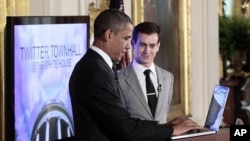President Barack Obama on Wednesday held his first-ever "Town Hall" meeting using the social media network Twitter, focusing on the U.S. economy and jobs. A chief executive not known for brevity fielded questions from across the United States in a more than an hour-long session from the East Room of the White House.
Mr. Obama's responses were summarized in Twitter posts by the White House, abiding by the standard 140-keyboard-character format, but he was not constrained in his spoken responses.
The event was streamed live on the White House web site and on a special page created by Twitter, carried by major cable news networks and on the web sites of numerous media organizations.
Twitter co-founder Jack Dorsey began by pointing to what he called a spirited worldwide online debate about the future, including America's financial security, in which Mr. Obama's name figured prominently.
"Today this vibrant discussion comes here to the White House and you get to ask the questions," Dorsey said.
With about 140 invited observers looking on in the East Room, President Obama sat briefly at a laptop bearing the presidential seal, and typed an opening tweet: "In order to reduce the deficit, what costs would you cut and what investments would you keep?"
He then answered a first question, read to him from a large TV screen by Dorsey, from New Hampshire Twitter user William Smith, asking what mistakes Mr. Obama felt he had made in handling the U.S. recession and what he would do differently.
The president said he acted correctly with his $800 billion recovery program and rescue of the U.S. auto industry, but mentioned this shortcoming.
"One would have been to explain to the American people that it was going to take a while for us to get out of this," he said. "Even I did not realize the magnitude, because most economists did not realize the magnitude of the recession until fairly far into it, maybe two or three months into my presidency where we started realizing we had lost three or four million jobs before I was even sworn in."
Other questions covered unemployment, the state of U.S. manufacturing, high costs of education, and hard negotiations with Congress over raising the federal debt ceiling and cutting trillions of dollars in deficit spending.
One tweet asked if Mr. Obama would use his executive power under the 14th Amendment to the U.S. Constitution to raise the government borrowing limit before an August 2 deadline.
The president used his response to urge lawmakers to work with him to achieve a compromise on the debt ceiling issue which he said if not resolved could spiral the country into another recession.
"The notion that the U.S. is going to default on its debt it just irresponsible, and my expectation is that over the next week to two weeks that Congress, working with the White House, comes up with a deal that solves our deficits, solves our debt problems and makes sure that our full faith and credit is protected," he said.
One tweet that got through thousands filtered by Twitter was from Representative John Boehner, Republican Speaker of the House of Representatives and key critic of the president's policies.
Here, Dorsey reads the question from Boehner, followed by part of Mr. Obama's response.
"After embarking on a record spending binge that’s left us deeper in debt, where are the jobs?"
"We are each month seeing growth in jobs but when you have got a eight-million-job hole and you're only filling it 100,000 or 200,000 jobs at a time each month, obviously what is way too long for a whole lot of folks out of work," the president said.
Other questions dealt with homeowners unable sell their under-valued homes, America's troubled public education system, and reducing the nation's dependence on imported oil, and the U.S. space program.
This was a portion of Mr. Obama's response to one questioner who suggested cutting U.S. foreign aid "to countries that waste it [such as] Pakistan."
"America, to be a leader in the world, to have influence, to help stabilize countries, to create opportunity for people so they don't breed terrorists, or create huge refugee flows and so forth, it is is smart for us to make a very modest investment in foreign aid," he said. "It is a force multiplier, and it is something that even in tough fiscal times America needs to continue to do as part of our role as a global leader."
The White House viewed the Twitter event as part of its expanding use of social media to communicate with Americans. White House Communications Director Dan Pfeiffer says it's no longer possible to do so only through mainstream media.
"When we do things with Twitter, Facebook and YouTube, it is similar to what previous presidents did with more traditional outlets like the networks and the major papers," he said.
President Obama participated in a Facebook event earlier this year at the California headquarters of the social media giant.
White House officials said they will look at analytical data Twitter provides, in conjunction with some of its partners, for more insights as Mr. Obama continues to use social media to reach out to the public.
**Watch the entire Twitter town hall session or read some highlights below:





